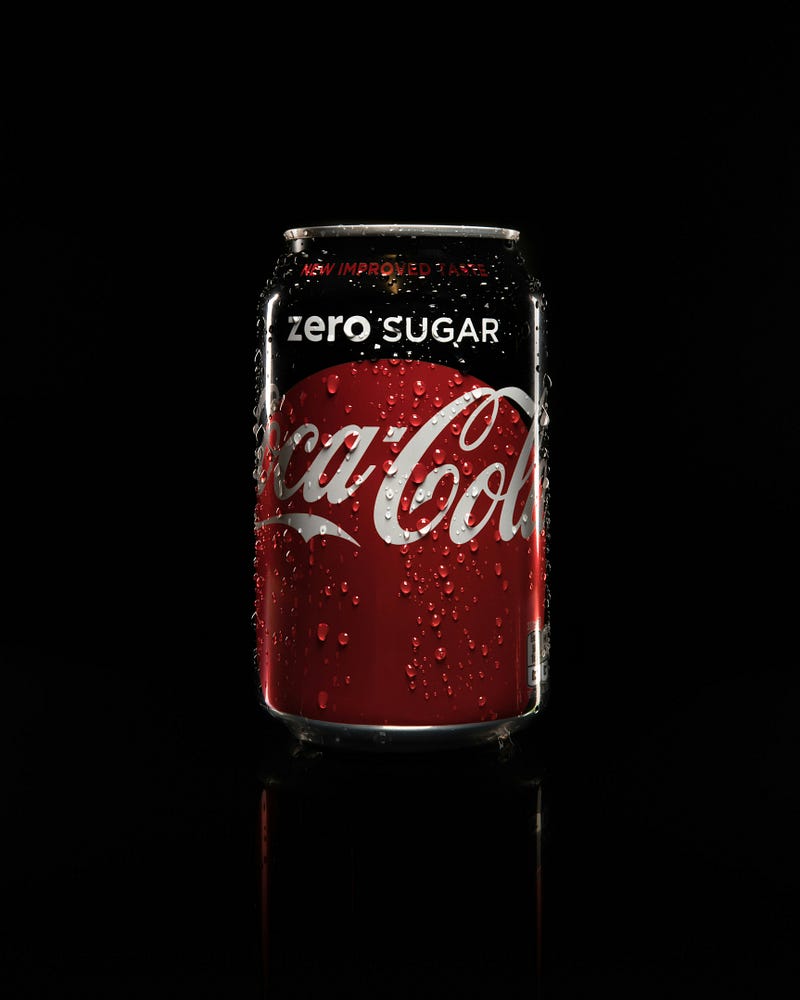
The World of Coca-Cola is a must-see attraction in Atlanta, Georgia. It provides an immersive and interactive experience on the history, production, and global impact of Coca-Cola.
During my visit, my favorite activity was sampling the different Coca-Cola beverage varieties worldwide. It was captivating to experience the unique flavors from other countries firsthand.

Of the rare flavors available for sampling, the one that stood out most to me was the Fanta Kolita from Costa Rica.
I found it slightly spicy, quite different from the sweet profile of the normal Fanta that I was familiar with.
Another flavor that I sampled tasted like cough syrup. I forgot which it was exactly, but that was my worst pick.
It is truly fascinating how tastes can vary across demographics.
With over 60+ other flavors to discover, the Tasting Room shows Coca-Cola’s dedication to tailoring its products to suit diverse markets.
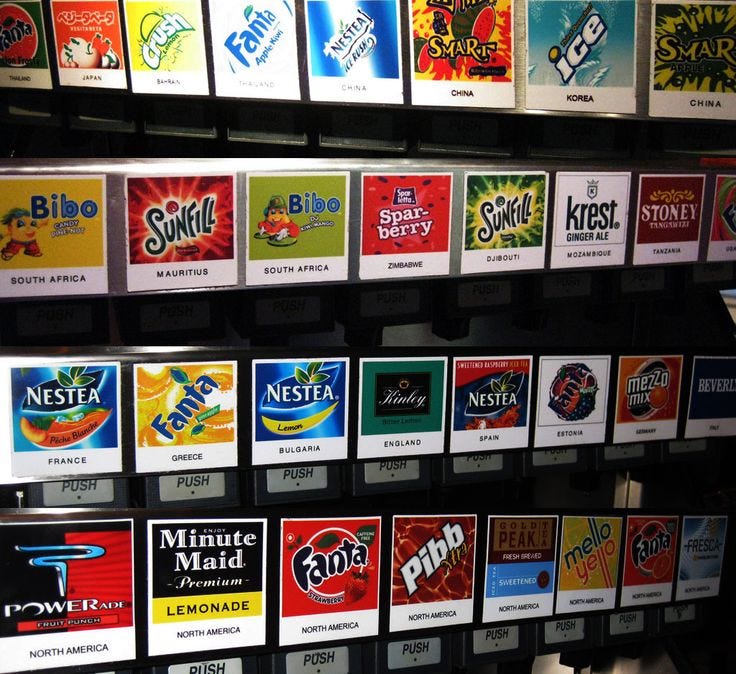
The brand is iconic with an unparalleled level of global reach and market dominance.
Coca-Cola holds nearly half of the global carbonated soft drink market, selling over 1.9 billion beverages worldwide.
Coca-Cola’s marketing prowess is truly unmatched, making the brand extremely popular globally.
Health Concerns Over Soft Drinks
The 20th century saw a significant change in the lifestyles of most individuals, marked notably by a drastic change in dietary habits. This brought about unprecedented consequences.
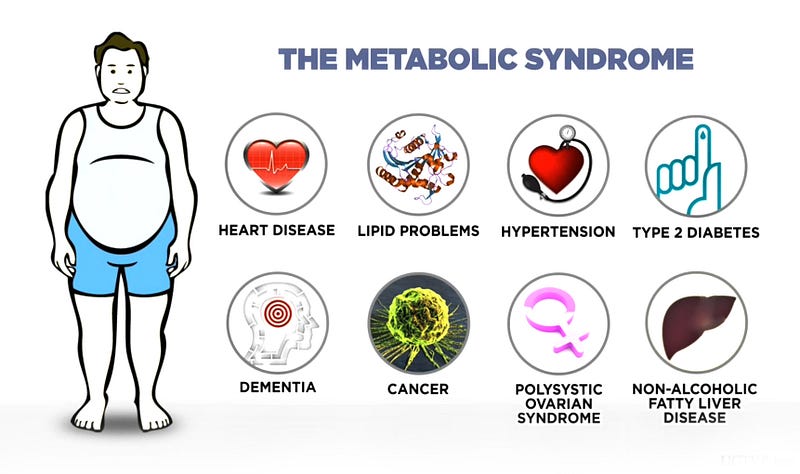
Metabolic diseases like Type 2 Diabetes which had been rare in previous generations were becoming more common.
Naturally, concerns about what could have led to this phenomenon grew. Sweetened beverages which had gained popularity during this period came under scrutiny as a possible contributor to the rise in metabolic ailments.

Subsequent evidence would confirm these suspicions.
In the early 1980s, public health campaigns and media coverage began to highlight the dangers of excessive sugar consumption, especially from sugary beverages.
Numerous studies were later published, well documenting the link between sugary soda consumption and negative health outcomes.
Today, these adverse health outcomes are widely acknowledged and recognized:
- Obesity
- Type 2 Diabetes
- Tooth Decay
- Weakened Bone Health
- Non-Alcoholic Fatty Liver Disease
Consequently, consumption of sugary beverages is widely recommended to mitigate these potential health problems.
Diet Drinks
Public perception is important to consumer brands.
Better public perception means more customers, more customers means a bigger market share which translates to large profits.

With the growing awareness around the detrimental nature of soft drinks on weight gain and diabetes in the 20th century, companies like Coca-Cola had to act swiftly.
They came up with diet drinks, a low-sugar, low-calorie alternative to cater to the needs of health-conscious consumers.
History Of Diet Drinks
The first diet drinks emerged in the late 1950s and early 1960s. They were niche products targeting a small market back then.
They used artificial sweeteners like cyclamate and saccharin which were low-calorie alternatives to regular sugar.
In 1963, Coca-Cola introduced Tab, the first diet soda to successfully target the general market of weight-conscious consumers.
The name “Tab” played on the idea of “keeping tabs” on one’s weight.

Pepsi followed suit, launching its diet alternative — Patio Diet Cola which would be rebranded to Diet Pepsi.
As health concerns regarding sugary beverages mounted in the 80s and 90s, diet sodas started gaining wide mainstream interest. Pepsi and Coca-Cola led the way with innovative marketing campaigns.
Consumers embraced these alternatives as viable options that allowed them to enjoy carbonated beverages while keeping track of their health goals.
Today, there’s a plethora of diet-carbonated drinks available in the market, Diet Coke and Diet Pepsi being the most popular options.

The global diet soft drinks is projected to reach $5 billion in revenue by 2025.
With the rising rates of obesity and diabetes worldwide, the demand for low-calorie drinks is expected to keep on growing, and many beverage companies are pivoting to meet this demand.
Do They Actually Work?
If you examine the nutritional profiles of diet sodas and compare them with those of regular sodas, you will see a significant difference in caloric intake.
Take the case between regular Coke and diet Coke.

A standard Coke contains 140 calories, contributed by the presence of regular sugar. In contrast, Coca-Cola Zero contains 0 calories, as indicated by its name.
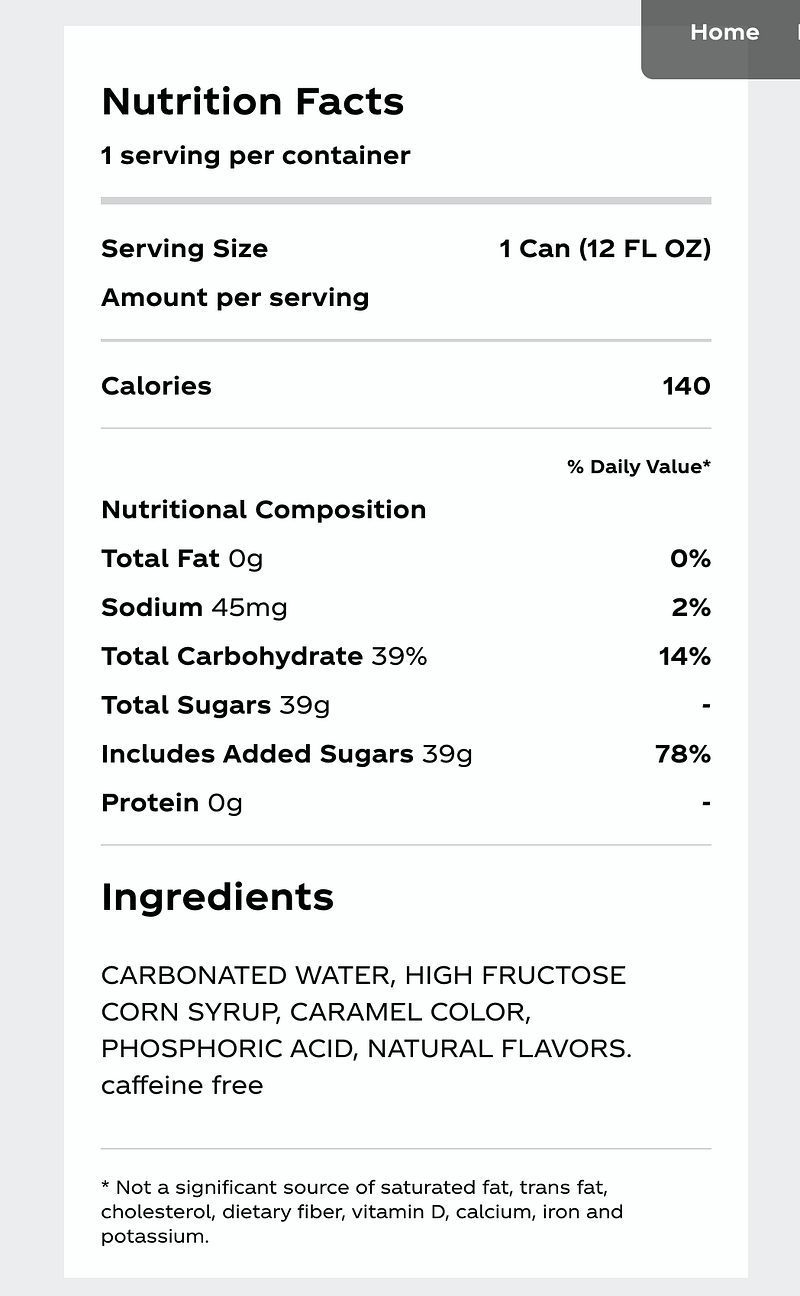
From a weight tracker’s perspective, reducing calorie intake through dietary adjustments aids in weight loss.
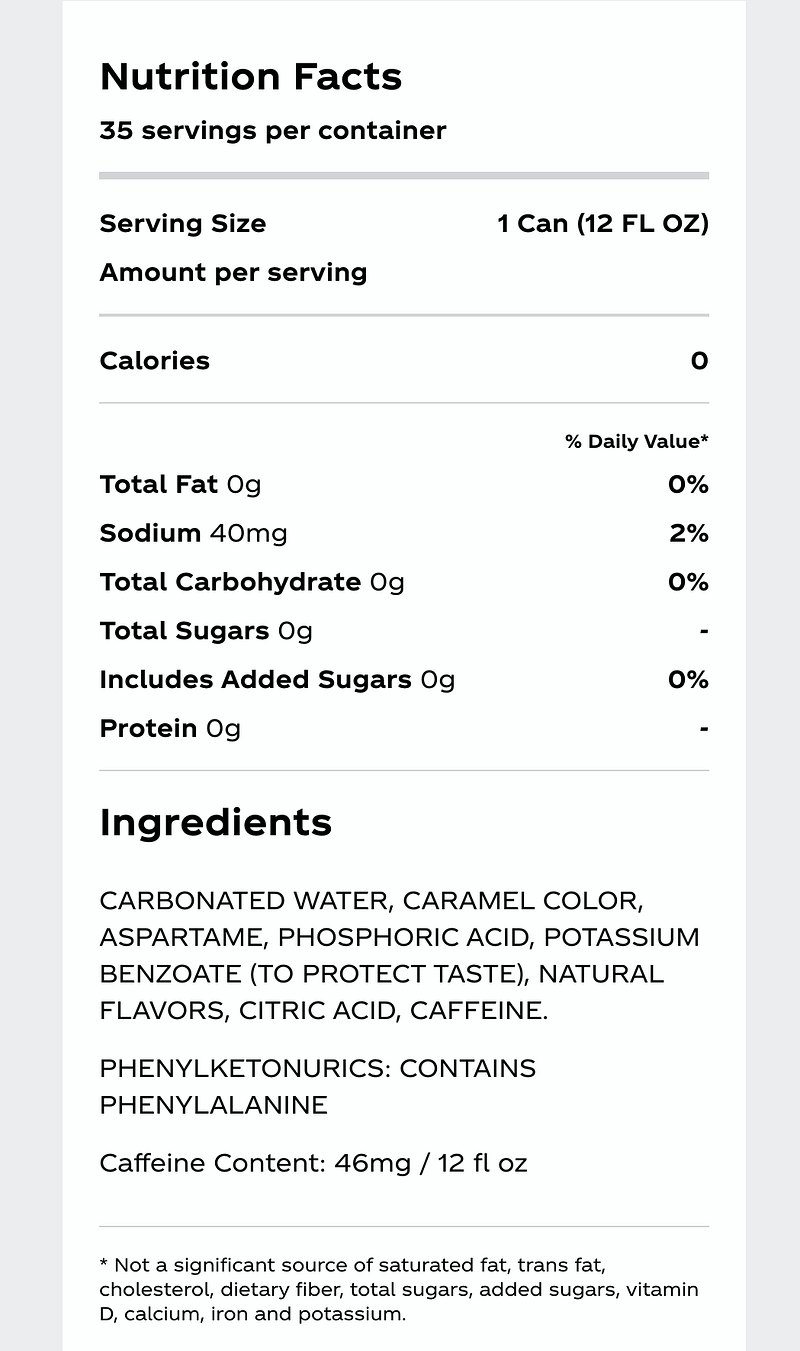
By switching from regular soda to diet soda, one takes out 140 calories from their intake. On the surface, this seems conducive for weight loss or weight maintenance, based on the calories in calories out equation.
However, things aren’t as straightforward as they seem. Aspartame, an artificial sweetener commonly added to diet drinks, introduces complexities to the equation.
Aspartame
As soda companies diversified their product offerings to cater to health-conscious consumers, their primary challenge lay in maintaining the same taste profile such that these consumers didn’t miss out on the original flavor.
Aspartame, though 180–200 times sweeter than regular sugar proved successful in replicating the taste.
Moreover, aspartame is stable, extending the shelf life of diet sodas and it is significantly more cost-effective than natural sweeteners like high fructose corn syrup.

Aspartame seemed to be a win-win for both consumers and producers of diet sodas: the companies have a cheap sweetener that extended the shelf life of their products, while health-conscious consumers found a low-calorie alternative without sacrificing the taste.
This victory has been short-lived as aspartame has faced scrutiny over the recent decades.
Science has sought to better understand its impact on health and actual effectiveness in aiding weight loss, and so far, the findings don’t paint it in a good light.
Health Risks Associated with Aspartame
As research into the effects of aspartame continues to develop, it remains a common additive in numerous food items.
However, accumulating evidence on its potential risks to human health seems to suggest that it may not be as safe as previously believed.
Some of these include:
Weight Gain
In typical situations, consuming sugary or sweet foods tends to trigger cravings for more. For instance, when having ice cream, it’s nearly impossible to limit yourself to just one spoonful.
This is because the dopamine hit your brain gets from ice cream encourages continued consumption, requiring significant willpower to resist.
Research suggests that both regular and artificial sweeteners like aspartame elicit similar responses in the brain.
This leads to cravings for high-calorie foods putting you on the likelihood of gaining weight and hindering your efforts of shedding it off.
Furthermore, a different study found that overweight and obese adults who drank diet sodas consumed more calories overall compared to those who drank regular sodas.

So, while it may seem like a low-calorie alternative, a diet soda could paradoxically lead to increased calorie intake through other means, causing weight gain over time.
Type 2 Diabetes
Some studies suggest that sweeteners like aspartame could lead to the development of Type 2 Diabetes.
This is because these sweeteners are easily digested and absorbed, spiking insulin in the blood.
These insulin spikes can lead to insulin resistance, a condition that puts one at increased risk of developing Type 2 Diabetes.
Neurological Effects
Aspartame consumption has been linked to neurological symptoms such as headaches, dizziness, mood changes, and cognitive impairment.

There are also concerns about potential links to neurological disorders like Alzheimer’s and Parkinson’s disease.
Conclusion
Occasional consumption of diet sodas is unlikely to result in significant health risks for most people.
However, moderation is key in mitigating any potential negative effects. Merely replacing regular sodas with diet sodas does not seem to provide the anticipated health advantages.
If your goal in consuming diet sodas is weight management or blood sugar control, you might want to reconsider your strategy.

There aren’t any real benefits other than the familiar carbonated taste from your favorite brand.
Considering how entrenched it is in many people’s lives, quitting soda consumption altogether is difficult.
Sodas accompany us everywhere, whether you’re hanging out with your friends watching a Champions League game, dining out, at family gatherings, exploring amusement parks, or even just watching movies.
While going cold turkey may not be easy, gradually transitioning to healthier beverage alternatives is a worthwhile step.
Options like plain or infused water, unsweetened sparkling water, unsweetened teas, and black coffee can provide satisfying and nutritious replacements for soda.
Replacing a habit like soda drinking requires conscious effort, but making the switch to these healthier choices can pay dividends for overall health and wellness in the long run.
So informative! Thank you for this.